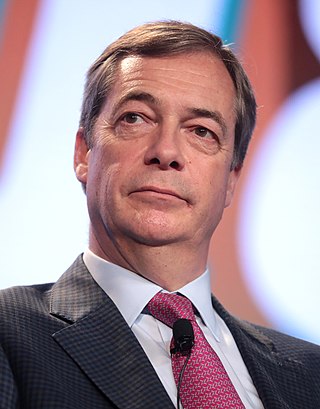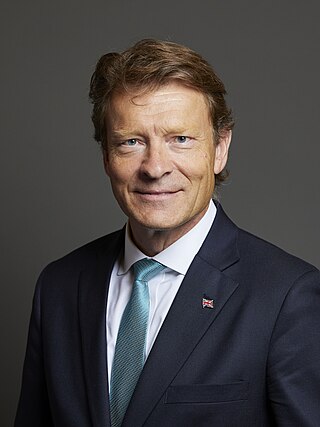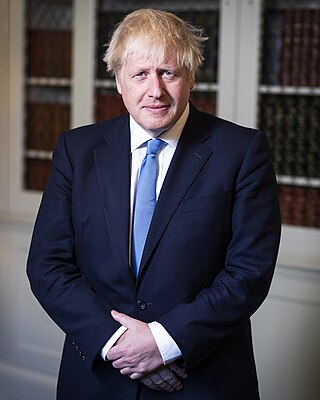
Nigel Paul Farage is a British politician and broadcaster who has been Member of Parliament (MP) for Clacton and Leader of Reform UK since 2024, having previously been its leader from 2019 to 2021. He was the leader of the UK Independence Party (UKIP) from 2006 to 2009 and 2010 to 2016. Farage served as a member of the European Parliament (MEP) for South East England from 1999 until the UK's withdrawal from the European Union (EU) in 2020.

Laura Juliet Kuenssberg is a British journalist who presents the BBC's Sunday morning politics show. She was succeeded as Political Editor of BBC News by Chris Mason.

Alexander Boris de Pfeffel Johnson is a British politician and writer who served as Prime Minister of the United Kingdom and Leader of the Conservative Party from 2019 to 2022. He was previously Foreign Secretary from 2016 to 2018 and Mayor of London from 2008 to 2016. He was Member of Parliament (MP) for Henley from 2001 to 2008 and for Uxbridge and South Ruislip from 2015 to 2023.

The 2016 United Kingdom European Union membership referendum, commonly referred to as the EU referendum or the Brexit referendum, was a referendum that took place on 23 June 2016 in the United Kingdom (UK) and Gibraltar under the provisions of the European Union Referendum Act 2015 to ask the electorate whether the country should continue to remain a member of, or leave, the European Union (EU). The result was a vote in favour of leaving the EU, triggering calls to begin the process of the country's withdrawal from the EU commonly termed "Brexit".

Brexit was the withdrawal of the United Kingdom from the European Union.

The 2019 United Kingdom general election was held on Thursday 12 December 2019, with 47,074,800 registered voters entitled to vote to elect 650 Members of Parliament (MPs) to the House of Commons. The governing Conservative Party, led by Prime Minister Boris Johnson, won a landslide victory with a majority of 80 seats, a net gain of 48, on 43.6 per cent of the popular vote, the highest percentage for any party since the 1979 general election, though with a narrower popular vote margin than that achieved by the Labour Party over the Conservatives at the 1997 general election. This was the second national election to be held in 2019 in the United Kingdom, the first being the 2019 European Parliament election.

The 2019 European Parliament election was the United Kingdom's component of the 2019 European Parliament election. It was held on Thursday 23 May 2019 and the results announced on Sunday 26 and Monday 27 May 2019, after all the other EU countries had voted. This was the United Kingdom's final participation in a European Parliament election before leaving the European Union on 31 January 2020; it was also the last election to be held under the provisions of the European Parliamentary Elections Act 2002 before its repeal under the European Union (Withdrawal) Act 2018, and was the first European election in the United Kingdom since 1999 to be held on a day that did not coincide with any local elections. This was the first of two national elections held in the United Kingdom in 2019; the 2019 general election occurred six-and-a-half months later in December 2019.

Richard James Sunley Tice is a British businessman and politician who has been Member of Parliament (MP) for Boston and Skegness and Deputy Leader of Reform UK since 2024, having previously been the chairman of the party from 2019 to 2021 and again briefly in 2024. Since 2023, he has also been Reform UK's energy and foreign-policy spokesman. He became the leader of Reform UK in March 2021, but stood down in June 2024 and was succeeded by Nigel Farage.

Theresa May's tenure as Prime Minister of the United Kingdom began on 13 July 2016 when she accepted an invitation of Queen Elizabeth II to form a government, succeeding David Cameron, and ended on 24 July 2019 upon her resignation. May's premiership was dominated by Brexit, terrorist attacks in Westminster, the Manchester Arena and London Bridge, the Grenfell Tower fire, and the Salisbury poisonings. As prime minister, May also served simultaneously as First Lord of the Treasury, and as Minister for the Civil Service. She also served as Leader of the Conservative Party.

Reform UK is a right-wing populist political party in the United Kingdom. Nigel Farage has served as the party's leader since June 2024 and Richard Tice has served as the party's deputy leader since July 2024. The party currently has five members of Parliament (MPs) in the House of Commons and one member of the London Assembly. The party also holds representation at the local government level, with most of its local councillors having defected from the Conservative Party to Reform UK. Following Farage's resumption of the leadership during the 2024 general election, there was a sharp increase in support for the party. Following the election, it was the third largest party by popular vote, with 4,117,610 votes achieving 14.3 per cent of the vote in total.

Led By Donkeys is a British political campaign group established in December 2018 as an anti-Brexit group, but which has also criticised other actions of the Conservative government. After the 2024 election of a Labour government, it defined itself as an "accountability project" and stated that the Labour government was also fair game.

Michael Eric Heaver is a British broadcaster and former politician. He was elected as a Brexit Party Member of the European Parliament (MEP) for the East of England constituency in the 2019 election and served in that role until the United Kingdom's withdrawal from the EU. Previously, he was the chair of the UK Independence Party (UKIP)'s youth wing, Young Independence.

June Alison Mummery is a British politician, and businesswoman, who has been Reform UK's Fisheries spokesperson since 2023. She was elected as a Brexit Party Member of the European Parliament (MEP) for the East of England constituency in the 2019 European parliamentary election, a role she held until the United Kingdom's withdrawal from the EU. Mummery is also the managing director of BFP Eastern Ltd, fish market auctioneers who operate in Lowestoft.

Louis Stedman-Bryce is a British care home director, property investor and former politician. He served as a Member of the European Parliament (MEP) for Scotland from 2019 to 2020. He was elected as a Brexit Party candidate but left the party in November 2019 to sit as an independent.

Boris Johnson's tenure as Prime Minister of the United Kingdom began on 24 July 2019 when he accepted an invitation of Queen Elizabeth II to form a government, succeeding Theresa May, and ended on 6 September 2022 upon his resignation. Johnson's premiership was dominated by Brexit, the COVID-19 pandemic, the Russian invasion of Ukraine, and the cost of living crisis. As prime minister, Johnson also served simultaneously as First Lord of the Treasury, Minister for the Civil Service, Minister for the Union, and Leader of the Conservative Party.
On 3 September 2019, the British Conservative Party withdrew the whip from 21 of its MPs who had supported an emergency motion to allow the House of Commons to undertake proceedings on the European Union (Withdrawal) Bill on 4 September. In the hours after the vote, the Chief Whip Mark Spencer informed the rebel MPs that they were no longer entitled to sit as Conservatives. This led to the loss of the Conservative/DUP majority in the Commons.
This article lists the election results of the Brexit Party in UK parliamentary elections and in elections to the European Parliament in 2019.
The 2019 European Parliament election for the election of the delegation from the United Kingdom was held on 23 May 2019. These were the last elections to the European Parliament to be held before Brexit.














